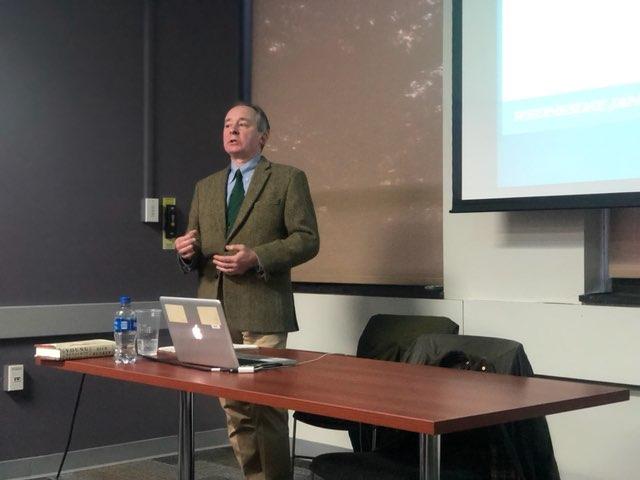
“What can I possibly say that you haven’t heard before?”
This is the question that author and historian Nick Bunker has for the people of the greater Philadelphia area. The subject of his latest research and novel, Benjamin Franklin, is a figure so deeply saturated within the American cultural canon that his name alone invokes images of bald eagles and camo-print tactical gear. Even as a native Brit, Bunker understands the ubiquity of Franklin’s legacy.
His trepidation over discussing Franklin, though, seems more than a little unfounded; if there’s one thing that Bunker knows how to do, it’s communicate history. His 2015 novel, “An Empire on the Edge: How Britain Came to Fight America” received the prestigious George Washington
— the highest for nonfiction history — and was also a finalist for the Pulitzer Prize for History.
On Wednesday, Bunker traveled all the way from the United Kingdom to join history-savvy students in Chamberlain Student Center Room 221A to discuss his latest nonfiction novel, “Young Benjamin Franklin: The Birth of Ingenuity.” In an event cosponsored by the history department, the Student History Association and Phi Alpha Theta history honors society, Bunker provided a lecture on one of Philadelphia’s most prolific historical figures.
Dr. Stephen Hague, an instructor within the History Department who specializes in teaching modern European history, gave opening remarks prior to the lecture.
“This is a really great opportunity to not only hear about Franklin in particular and Franklin’s role in science, really bringing together things of interest to the Rowan community, but also to learn about the process of history,” Hague said.
“I hope that I’ll tell you some things that are unusual and that are not part of the usual discourse on Franklin,” Bunker said. “There is a huge industry of Franklin scholarship. However, there are still some aspects of his career which are oddly neglected. The first is his origins and his early life, which have not been written about anything like as much as they should. This is part of the reason why I wrote the book.”
Thus was the inception of “Young Benjamin Franklin.”
“It begins with his forbearers in seventeenth century England,” Bunker said of the book’s content, “which is an essential part of the story. It then goes on to tell the story of Franklin as a child, as a youth and as a young man, from his birth in 1706 until he reaches the age of 41 in 1747.”
While many historians have placed great emphasis on Franklin’s roles as a political leader and organizer in America’s early independence, Bunker believes that it was Franklin’s role as a scientist, and particularly his work with electricity, that catapulted his status among American society.
“This was the turning point of Franklin’s life,” he said, “because it was science that was going to make him a household name—and one particular science, which is physics. In my book, everything leads up to the moment in which he does become a physicist.”
Franklin’s myriad accomplishments list him as postmaster, journalist, printer, freemason, political theorist, inventor and diplomat. For his firm belief in federal colonial unity, Franklin even earned the title of “The First American.”
“He was a man of many parts,” Bunker said, “but there were some parts that were more important than others, and you can’t say often enough that science, and really physics, was the essential ingredient to Franklin’s success. It was his work in electricity that gave Franklin the prestige and the esteem and the confidence that propelled him out of Philadelphia, and onto the international stage.”
According to Bunker, it was physics alone which granted Franklin the international reputation necessary to serve as a leader in other capacities. While some work in physics is done to perform some practical application, Franklin’s work was borne out of a curiosity fostered by his upbringing and early personal life.
“Physics is like sex,” he said, quoting 1960s American physicist Richard Feynman. “Sure it can give some practical results. But that’s not why we do it.”
Bunker’s focus on Franklin’s scientific work as a linchpin of his overall historical legacy reflects a nuance to Bunker’s work that is often overlooked within academia.
“The history of science is a curious kind of discipline in that it is very new,” he said. “For a time, the history of science was seen as a quite sexy subject, at the cutting edge of history. Since the 1940s, its kind of been neglected.”
Bunker and Franklin find some common ground in their versatility of skillset. After graduating from Cambridge University, he undertook careers in both banking and finance journalism before becoming a working historian and author.
All sales of the book, which were available for signing, benefited Phi Alpha Theta.
For questions/comments about this story, email arts@thewhitonline.com or tweet @TheWhitOnline.




